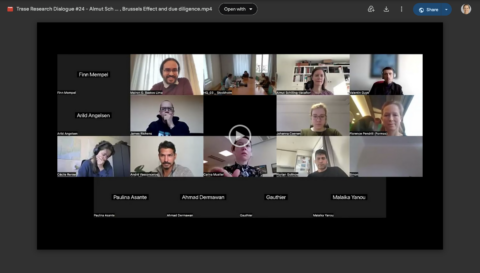Trase Research Dialogue #24 with Mairon Bastos Lima and Almut Schilling-Vacaflor
Trase Research Dialogue #24 – Supply chain divergence challenges a ‘Brussels effect’ from Europe’s human rights and environmental due diligence laws
On 6 March 2024, Mairon Bastos Lima (Stockholm Environment Institute) and Almut Schilling-Vacaflor presented and discussed their article “Supply chain divergence challenges a ‘Brussels effect’ from Europe’s human rights and environmental due diligence laws” published by Global Policy. You can watch the recording here: https://drive.google.com/file/d/1lPI2S4_4434MtA0WnSBoKAeC54Gxe-uP/view
European countries have led a new global trend on mandatory human rights and environmental due diligence (HREDD), advancing the EU’s growing global regulatory ambitions. Here, we analyse the prospects for successful externalisation of Europe’s sustainability standards – a ‘Brussels Effect’ – using Brazilian soy as a case. Our analysis exposes how the practice of supply chain divergence (i.e., the segmentation of exports tailored to different consumer requirements) can easily evade policy impacts and negate their additionality where Europe commands a minor market share. To avoid becoming just a niche market in these cases, the EU would need to expand on its actions, (i) engaging with other major consumer countries to ‘export’ its standards, (ii) doubling down on HREDD’s coverage to include financial actors and companies trading with other markets, and/or (iii) moving beyond ‘do no harm’ policies to adopt more strategically targeted ‘do good’ instruments to counter drivers of deforestation on the landscape level.
